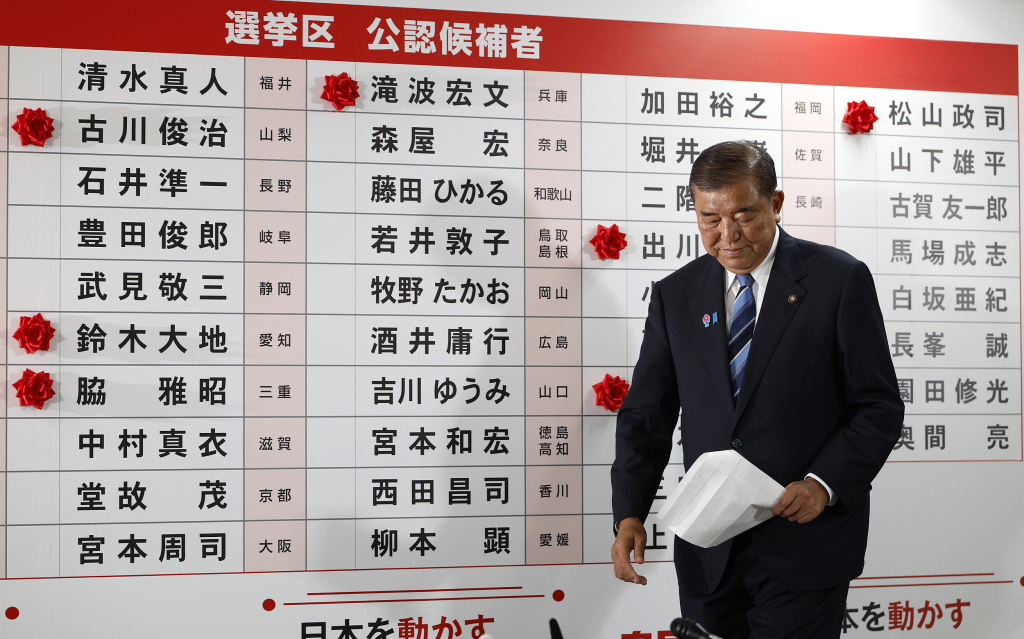
Tranalysis
The Japanese ruling coalition suffered another major defeat in the Senate election held on July 20, following their loss in the House of Representatives election last October.
According to Xinhua News Agency, in the 27th Senate election in Japan, the ruling coalition consisting of the Liberal Democratic Party and Komeito did not secure a majority of seats in the Senate. This isSince its establishment in 1955, the Liberal Democratic Party has, for the first time, failed to secure a majority of seats in both the House of Representatives and the Senate.
According to Japanese media reports, after the election, the Liberal Democratic Party and the Komeito Party hold 122 seats in the House of Councillors, while the opposition parties collectively hold 126 seats. There have been calls within the Liberal Democratic Party for Japanese Prime Minister Shigeru Ishiba to resign due to his responsibility, but Ishiba expressed his intention to remain in office on the evening of the 20th, stating \he has an important responsibility to the country.\

On July 20, 2025, local time, in Tokyo, Japan, at the headquarters of the Liberal Democratic Party (LDP), Japanese Prime Minister and LDP President Ishihara Shigeru walked past a display board with the names of elected candidates. Visual China Photo
\Shi Gemao is facing a triple dilemma,\ said Chen Zilei, director of the Japan Economic Research Center at Shanghai University of International Business and Economics and president of the Shanghai Association for Japanese Studies, to The Paper (www.thepaper.cn), indicating that the dilemma isHow to win the support of the opposition parties to form a three-party coalition government; the second is how to appease the emotions of the \rebel faction\ within the party to stabilize the party's foundation; the third is how to account to the Japanese people. If these three major issues cannot be resolved, the Ishinabe regime could collapse at any time.At present, Shigetada Isomura can be regarded as the \most tired\ and \most humble\ prime minister since the founding of the Liberal Democratic Party.
In terms of the opposition, the National Democratic Party and the Citizen's Party have made a splash, with a significant increase in their seats in the Senate. Among them, the Citizen's Party, which chanted the slogan \Japanese First\ during the election, increased its seats from 1 to 14, allowing the party to propose non-budgetary bills in the Senate.
Director and Professor Lian Degui of the Japan Research Center at Shanghai International Studies University pointed out to The Paper that the significant increase in seats for the National Democratic Party and the participating party is due to voters' disappointment with the ruling coalition of the Liberal Democratic Party and the Komeito Party, as well as a loss of confidence in the main opposition parties such as the Constitutional Democratic Party of Japan. These two parties are merely \catchers\ for voters disappointed with the LDP, and as two minor parties, it will be difficult for them to bring about substantial changes, especially with the participating party's proposal of \Japanese people first,\ which is just to attract attention during the election period.
\Shi Po Wan\ is swaying in the strong headwind, with the foundation of power shaken, public support rate low, and Japan-US tariff negotiations at an impasse. Chen Zilei believes that if Shi Po cannot solve the current predicament, the Japanese political arena may enter a \Warring States Period,\ with major and minor political parties forming alliances and rivalries, recreating the chaotic situation of the 1990s.
Shigeru Ishihara stays or leaves
This is the third major election defeat the Liberal Democratic Party has suffered since Shigeru Ishiba took office. In the House of Representatives election last October, the Liberal Democratic Party was severely damaged by a \black money\ scandal, not only losing its majority status, but also failing to achieve a majority in the ruling coalition with the Komeito Party, facing the worst situation since 2009. Subsequently, in the Tokyo Metropolitan Assembly election in June this year, which was seen as a prelude to the House of Councillors election, the Liberal Democratic Party suffered a crushing defeat, with the number of seats reaching a new low. Then came the defeat in the House of Councillors election.

On July 20, 2025 local time, in Tokyo, Japan, Japanese Prime Minister Ishinomaki Shigeru delivered a speech to the media at the vote counting center of the Liberal Democratic Party of Japan. Visual China Image
During last year's House of Representatives election, Shiha Mo did not completely eliminate all corrupt elements within the Liberal Democratic Party (LDP) related to the \black money\ scandal. Public distrust in the issue of \politics and money\ is strong, which has become a major reason for the significant damage to Shiha's cabinet's public support. Lian De Gui analyzed that the main reason Shiha failed to completely remove personnel related to \black money\ was to gain support within the party, leading to his loss of credibility with the public, a consequence that has been affecting his public support rate. Since then, he has not taken measures to win public opinion in policy, but has been preparing for the Senate election.
On the night of the 20th Senate election, when asked about his future plans on a program by the Japan Broadcasting Corporation (NHK), Shigeru Ishiba expressed his intention to stay in his position. He said, \At present, we are still the largest party with the most seats. What I have been advocating during the nationwide campaign—such as wage increases that exceed the rate of inflation, dealing with a severe security environment, disaster prevention measures, regional revitalization, and strategies to address population decline—are all responsibilities we must undertake for our country. We must be deeply aware of our responsibility as the largest party in the Diet.\
In another program on Tokyo TV that night, Ishihara also talked about one of the reasons for continuing to serve as Prime Minister, which is that the tariff negotiations with the United States are still ongoing. \I have personally had face-to-face talks with President Trump twice, and we have had many phone conversations.\
And within the LDP, movements concerning the \post-Ishihara era\ have quietly begun. It is analyzed that many within the LDP have expressed dissatisfaction with Shigeru Ishiba, and some wish to replace him, but the question lies in whether such voices constitute the majority and how the LDP Secretary-General Moriyama will coordinate.
\Is it now permissible for a political vacuum to occur? A comprehensive consideration of various aspects is necessary before making a judgment.\ The Secretary-General of the Liberal Democratic Party, Moriyama Yu, said on the evening of the 20th in an online program when discussing the issue of the Prime Minister's stay or departure.
Who can pick up the pieces outside of the shattered stone?
According to the Jiji Press on the 20th, lawmakers within the Liberal Democratic Party who oppose the Prime Minister are expected to hold an emergency meeting in the near future. There are also rumors that former faction leaders plan to convene a meeting, and the dynamics surrounding the LDP presidential election are becoming active. A senior party official pointed out, \The faction supporting the Prime Minister's continuation in office and the opposing faction are in a fierce struggle.\
According to Asahi Television on the 20th, the LDP's top advisor Taro Aso told those around him that he would not allow Ishinaka to continue governing.
Former Minister of Economic Security and a strong candidate for the \post-Ishihara era,\ Takashi Shimizu, said on July 18 while campaigning for the Senate election: \I have made up my mind to reshape the backbone of the LDP. For this, I will fight with all my might.\ This statement was interpreted as demanding that Shintaro Ishihara take responsibility and resign, on the premise that the LDP would not secure a majority of seats.
In addition to Hayana from Takamatsu City, Chief Cabinet Secretary Yoshimasa Hayashi, former Minister in charge of Economic Security Takayuki Kobayashi, and Minister of Finance Katsuyuki KATO are all considered as potential candidates for the LDP presidency. Additionally, former Japanese Prime Minister Fumio Kishida, who is currently 67 years old, is also thought to have a chance to return to power.
However, amidst the chaos, \without the diamond drill, don't take on the china repair job.\ Chen Zilei pointed out that if Shi Po steps down, the prospect of the LDP and other parties forming a coalition government will become more difficult, because currently only Shi Po within the LDP can engage in equal dialogue with the opposition parties, and whoever takes the stage within the LDP will have to face a \mess,\ and cleaning up the aftermath is not an easy task.
Moreover, the change of the Prime Minister will also affect Japan's diplomacy, especially at the critical moment of Japan-US tariff negotiations. On the 7th of this month, Trump wrote to Ishihara Shigeru, announcing plans to impose a 25% tariff on Japanese goods imported to the US starting from August 1st. Trump sent another strong signal on the 16th, implying that it would be difficult to complete negotiations with Japan before August 1st, and the US side might \carry out according to the content of the letter.\
The Wall Street Journal reported that if there is a shock in Japanese politics, it could lead to the fragile trade negotiations between Japan and the U.S. falling into chaos within weeks of the punitive tariffs taking effect. The weakening of Ishihara's political status means that if the Japanese side eventually reaches an agreement with the U.S., especially involving sensitive areas such as agricultural products or automobiles, it will be difficult to convince enough lawmakers to support the agreement.
The prospect of the opposition party joining the ruling coalition.
As both the ruling and opposition parties lose their majority seats in the Senate, both the House of Representatives and the Senate will be controlled by the opposition parties with a majority of seats. In order to smoothly advance the budget and the passage of bills in Congress, the Liberal Democratic Party and the Komeito Party inevitably need to cooperate with the opposition parties, and may seek to form a coalition government with the opposition parties.
Shigeru Ishiba is open to cooperating with opposition parties. On the evening of the 20th, he said in an online program: \Regarding how to deal with issues such as population decline, disaster prevention, and security, we will sincerely cooperate with parties that are willing to work together and take responsibility for the next generation.\
The leader of the Constitutional Democratic Party, Yukio Edano, stated: \Public opinion has clearly conveyed a 'no' to the Ishinabe regime,\ demonstrating a confrontational stance. However, even when the Liberal Democratic Party is in the minority in the House of Representatives, the opposition parties have not been able to unite against the ruling party. Therefore, it is still uncertain whether the outcome of this election will lead to a unified front among the opposition parties to force a change in the government.
\The opposition parties themselves are not united, lack a foundation for joint governance, and have relatively low approval ratings; they are well aware that they cannot replace the Liberal Democratic Party.\ Chen Zilei believes that, in fact, the opposition parties do not want to govern because both domestic and foreign affairs are facing thorny difficulties. The only way to participate in governance is to cooperate with the Liberal Democratic Party, and the right-wing party \Japan Restoration Party\ may be one of the main targets for the Liberal Democratic Party to court.
The leader of the Japan Innovation Party, Yoshimune Kishimoto, held a press conference in Osaka City on the 20th, stating regarding the way of getting along with the Liberal Democratic Party: \We will express our views based on different policies. We have not considered joint governance.\
Lian Degui believes that, from a political philosophy perspective, the possibility of the Liberal Democratic Party (LDP) drawing the National Democratic Party into the ruling coalition is relatively high, as it is close to the philosophy of the Ishinari faction within the LDP. There may be differences in specific policies, and it will also depend on the negotiations and transactions between the two parties in the future.
The leader of the National Democratic Party, Yui Kishida, denied the option of joining the ruling coalition on the evening of the 20th in a program on Asahi TV, saying: \We cannot cooperate with the Ishihara regime that cannot fulfill its promises.\ Yui strongly criticized that the executive officers of the Liberal Democratic Party, the New Komeito, and the National Democratic Party reached an agreement on \raising the threshold of annual income from 1.03 million yen to 1.78 million yen\ and \abolishing the provisional tax rate on gasoline\ in December last year, but so far it has not been fulfilled.
The participating party that achieved a significant leap in the election stated that it is not considering joining the government at this stage. The party leader, Sheng Gu Zongbi, said on the evening of the 20th: \If there are issues or bills that are crucial to the national interest and must be passed at all costs, we are not completely ruling out cooperation with the Liberal Democratic Party and others. However, we have not considered seeking positions just to get closer.\ He expressed that his vision for the future is to form a coalition government like in Europe, composed of several small parties, such as a coalition of four or five parties governing together.
With the end of the Senate election, the provisional Diet, which determines the composition of Congress, was originally scheduled to convene on August 1st. However, if there is a resignation of the Prime Minister and a need for a Liberal Democratic Party presidential election, Congress will also have to hold a re-election for the Prime Minister, and the schedule for the session will face adjustments.
During the period before the convening of the temporary Congress, the movements of the \post-Ishihara era\ candidates within the LDP, the alliances and rivalries of the old factional forces, and the LDP's exploration of strategies to cooperate with the opposition parties will all become the focus of attention.




